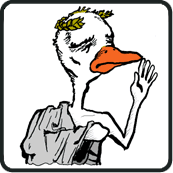We recently went to a party, and while blatantly eavesdropping on people's conversations, we overheard the following statements:
- "My last boyfriend had to take his mom out to dinner once a week - he's got the biggest Oedipus complex this side of Athens!"
- "My personal trainer is such a monster - he can bench press 5,000 pounds. He's really got the strength of Zeus."
- "Even though the copy guy down the hall is completely incompetent, he's so cute that I do all my copying twice just to hang around him - he's going to be my Achilles' heel!"
- "My intellectual girlfriend named her bunny slippers Cassandra and Calliope and she won't tell me why - what do those names mean??"
Notice a pattern? (Besides the fact that we attend really dorky parties.) All of these statements have origins in Greek mythology. Greek mythology is fascinating, because while it can sound academic, it's really a whole bunch of interesting stories that have influenced such diverse areas of thought as philosophy, psychology, literature, theater and art. So if you want to have a better appreciation of these areas (and want to impress your friends the next time they are wondering where the Elektra record company came up with its name), we'll start you on the right path.
1. LEARN HOW TO RECOGNIZE A GREEK MYTH
A myth is really more of a concept than something that can be defined. It's kind of like trying to explain The Artist Formerly Known as Prince - you can tell the story, but it takes a little while.What is a myth?
The word myth, which literally means "word" or "story" in ancient Greek, refers to authorless tales perpetuated by ancient communities. Other communities besides the Greeks, such as the Sumerians (those guys lived for summer vacation) and Egyptians also perpetuated communal myths, but the Greek ones are most prevalent in Western culture. The characters in Greek myths are typically gods and heroic humans. Each story contains a lesson for mortal humans on earth to learn from the immortal gods and various kinds of tragic human heroes. Most often, these lessons either concerned morality or an explanation of how a feature of nature was created.
The Romans also maintained a collection of myths. Actually, almost all of their mythical stories and characters are taken from the original Greek myths. The essential difference is that while Greek myths generally seek to express a moral lesson or explain a facet of nature, Roman myths often also have a political message. The names of the Roman gods and heroes are the Latin translation of the Greek names. So, for example, in Greek mythology, Zeus is the god of the sky; in Roman mythology, Jupiter plays this role. Both are said to have essentially the same history and families.
The interesting thing about these early myths is that they were primarily transmitted orally from one generation to the next. Because they were never written down, they could be told slightly differently depending on who was doing the telling/exaggerating, and this could alter the myth's essential message. Fortunately, pencils were eventually invented, and myths were recorded in print. The two main myth-writing guys were Hesiod and Homer.
- Hesiod, who lived during the 7th Century B.C., wrote a poem called The Generation of the Gods. In it, he explained the origins of the immortal Greek gods. According to Hesiod, the gods live at the summit of a mountain called Mount Olympus. Many gods represent a part of the natural universe. For example, the first gods were Uranus, a male god signifying heaven and Gaea, a female god signifying Earth. These two original gods had many children and grandchildren, one of whom was the famous Zeus. Zeus, the most powerful god, and his wife Hera are the leaders and parents for the most famous Greek gods who live on Mount Olympus.
- Homer, a Greek poet who lived in the late 8th Century B.C., wrote two very influential epic (translation: LONG) poems that helped to define mythology. He wrote The Iliad and The Odyssey, which chronicled events during the Trojan War. His poems take place in Greek cities like Corinth, Thebes and Athens, and spoke of human characters with names like Agamemnon, Menelaus and Achilles. Though not gods, the stories of these characters' lives were considered to be myths and were further dramatized by Greek dramatists such as Sophocles, Euripides, and Aeschylus.
These stories were about murder, adultery, incest, power struggles, and love - very Days of Our Lives. According to Greek mythology expert H.J. Rose, the gods are "glorified men and women who remain extremely human, and on the whole, neither irrational nor grossly unfair in their dealings." In a sense, for the human characters in these heroic Greek myths, the gods represent what Hollywood stars represent to us non-famous people: figures who are larger than life and part of an unreachable realm. They have raucous orgies and they always get to do cool things.
Just as magazines can be broken down into those that discuss fashion, cars, vegetarianism, and nudism, certain myths deal primarily with particular topics. One type of myth deals with explaining the creation of the world. Another kind of myth explains the family history and hierarchical social structure of the gods who live on Mount Olympus. Human problems (and the way humans use advice from the gods to address them) represent another kind of myth. Of course, myths weren't categorized this way on purpose, because, as we said at the beginning, they started out as simple tales. But we anal-retentive humans have found plot patterns within the stories.

 -->
-->